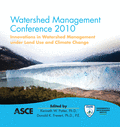Effects of Climate Change on the National Flood Insurance Program in the United States—Riverine Flooding
Publication: Watershed Management 2010: Innovations in Watershed Management under Land Use and Climate Change
Abstract
The recently published Fourth Assessment Report of the Intergovernmental Panel on Climate Change (IPCC) concluded that it is very likely that the frequency of heavy precipitation events will increase over many regions as our climate warms over the next century. The impact on the National Flood Insurance Program (NFIP) associated with a change in climate necessitates a thorough analysis of the effects of extreme precipitation and temperature events on flooding in the United States. This AECOM-Baker study being conducted for the Federal Emergency Management Agency (FEMA) seeks to quantify how the 1-percent-annual-chance flood (base flood used by FEMA for floodplain mapping) may change based on climate model projections through the year 2100. Also being considered in the FEMA study, but not discussed in this paper, are how projected changes in sea level and the frequency and intensity of coastal storms may affect the NFIP. Extreme climate indicators were developed previously as part of the IPCC effort to aid in quantifying the frequency and severity of extremes in temperature and precipitation and are used throughout this study to relate observed climate extremes to future extreme climate projections. The methodology also assesses the uncertainty of these projections by using multiple climate model data sets. Regression analysis was used to relate watershed characteristics such as drainage area, channel slope, basin storage, and impervious area, as well as observed extremes in climate, to the existing 10- and 1-percent-annual-chance flood discharges. The observed regression relationships were then used within a Monte Carlo sampling framework to determine distributions of how the 10- and 1-percent-annual-chance floods may change given uncertain projections in extreme climate and population growth. A regression equation that related flood depth to flood discharge was incorporated in the Monte Carlo simulation and was used to estimate the increase in the 10- and 1-percent flood depths, and the associated increase in floodplain boundaries. The results of this study will show the potential future impacts on the NFIP that result from projected climate change.
Get full access to this article
View all available purchase options and get full access to this chapter.
Information & Authors
Information
Published In
Copyright
© 2010 American Society of Civil Engineers.
History
Published online: Apr 26, 2012
ASCE Technical Topics:
- Analysis (by type)
- Business management
- Climate change
- Climates
- Construction engineering
- Construction management
- Engineering fundamentals
- Environmental engineering
- Federal government
- Flood frequency
- Floods
- Government
- Insurance
- Mitigation and remediation
- Organizations
- Practice and Profession
- Project management
- Regression analysis
- Statistical analysis (by type)
- Water and water resources
Authors
Metrics & Citations
Metrics
Citations
Download citation
If you have the appropriate software installed, you can download article citation data to the citation manager of your choice. Simply select your manager software from the list below and click Download.
